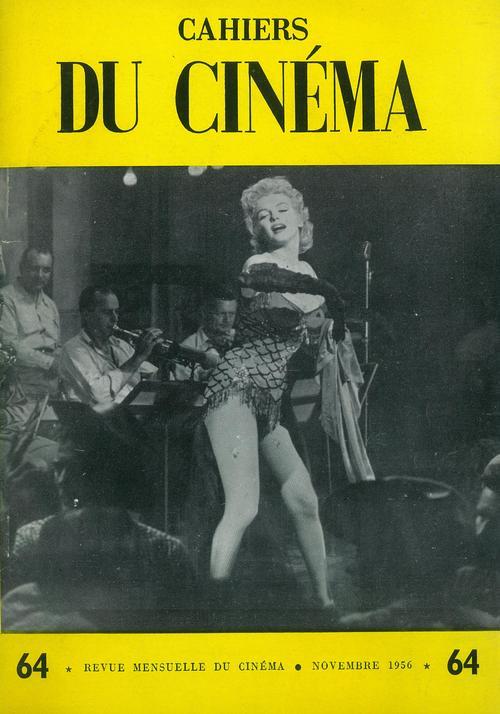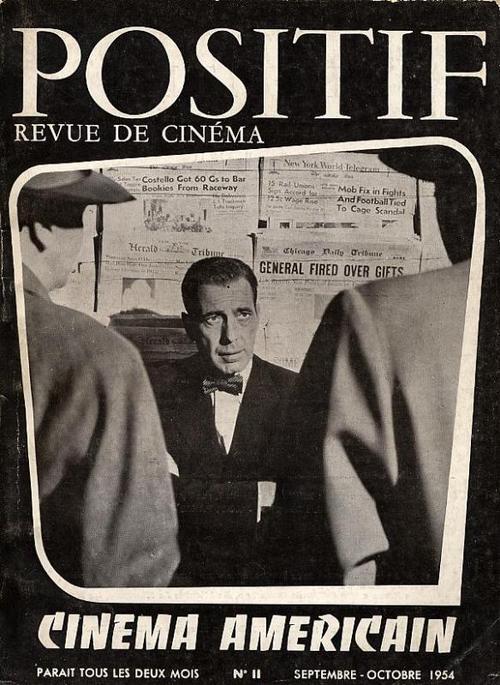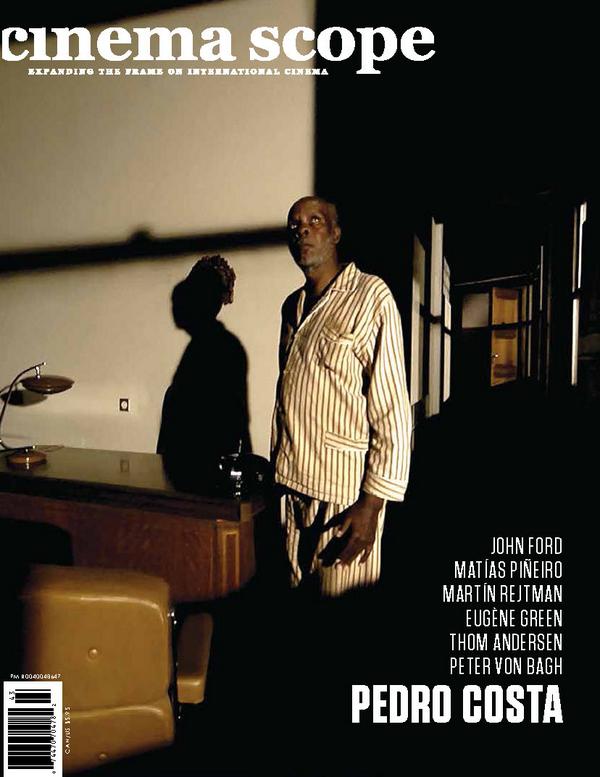It’s on Ed’s
blog Les Cahiers-Positifs that I
discovered Godard also reviewed Hitchcock’s The Man Who Knew Too Much (1956). I thought he only reviewed Strangers on a Train and The Wrong Man by Hitch. I guess, I was
wrong. It happens. Anyways, on the cover of the November 1956 issue of Cahiers (N.64) there is a still of
Joshua Logan’s Bus Stop with Marilyn
Monroe, which is reviewed by Jacques Doniol-Valcroze (a critic whose output
deserves more attention). The early defining features of Cahiers are: André Bazin’s friendship with François Truffaut, the
young critics fight to take over the magazine, and Hitchcock as a defining
figure for the group. The Critiques were, and are, the most important section
at Cahiers – their chronicle of the
films, and the times – and these early Hitchcock reviews are the seeds that the
magazine would grow out of. (More so than those on Nick Ray, whose affinity never really left the magazine). Even Truffaut and Godard, whose friendship broke in
the post-’68 years (c.f. their last correspondence), would remain loyal to
Hitchcock throughout their whole careers: the Hitchcock interview book for Truffaut and Godard, who would return
more to narrative filmmaking after Truffaut’s death (a reconciliation?), in his
Histoire(s) describes Hitchcock as
the “greatest creator of form in the 20th century.” Hitchcock would also play a
significant role when the magazine renewed itself in the Eighties through their critical appreciation of Brian dePalma and how his films interrogate Hitchcock’s impulses and artistry. And Hitchcock is also at the root of their current appreciation of Steven Spielberg and
how he is able to mediate between personal projects within an industrial studio
system. – D.D.
***
The Student’s Path
One market
day an Allied secret agent, disguised, of course, as an Arab, is killed right
in the middle of the crowd in Marrakech. An important diplomat is shortly to be
assassinated. Before he dies, the spy manages to whisper his secret to an
innocent witness to the crime, an American tourist who is then uncertain
whether or not to pass it on in his turn to the (ex) French police in Morocco.
A telephone call helps him make up his mind to say nothing. His little boy has
been kidnapped, says a voice at the other end of the wire, and if he talks, he
and his wife will never see their child again. An incredible but very real
threat, which instantly fills our two Babbitts – James Stewert as a doctor from
Indianapolis and Doris Day as a once-celebrated singer – with alarm. Neverless,
like a modern Robinson family, they launch out into the unknown, following
their adventure without losing heart. Where to? To London. They have reason to
believe that the plot will unravel there. Zig and Puce on Dolly’s trail could
not show more heroism or more commend sense. Chance it and trust to God. Que sera, sera. This is also the opinion
of Scotland Yard, who are waiting as they leave the plane. An important
official wants to take the affair in hand. He fears complications of the kind of
French Cabinet calls ‘cosmic’. Is it worth the risk of aggravating an already
tense international situation for a little boy? James Stewart and Doris Day say
yes. Who can blame them? We, too, have little boys, or maybe little girls. But
no matter – they must act. And, in fact, with a little luck – but they earn it
– our amateur Perry Masons soon pick up the kidnappers’ trail, meanwhile
unwittingly foiling the plot of a foreign Power which has once again tried to
undermine the prestige of old England.
It
is easy to see what is likely to shock the susceptible in this story: the touch
of extravagance and, what obviously attracted Hitchcock, the introduction of
this extravagance in lives as ordinary as yours and mine. This is perhaps the
most improbable of Hitchcock’s films, but also the most realistic. What is
‘suspense’? Waiting, and therefore a void to be filled; and more and more
Hitchcock loves to fill it with asides which have little bearing on the event.
When
he leaves the studio to shoot on location, the director of To Catch a Thief allows his actors more freedom, lets his camera
linger on a landscape, seizes neatly and firmly on every droll character or
bizarre object to come his way. The scenes in the bedroom, the Arab café, the
two police offices (French and English), the taxidermist’s shop, the
Presbyterian chapel, the concert or the embassy ought, if they are logical, to
make all the Buñuels and Zavattinis of this world pale with envy. Today Alfred
Hitchcock looks all round his characters, just as he forces them to look round.
Not that he ever loses interest without tenderness, he had never before
stressed with such fierce irony the ridiculousness of the most natural.
Everyday gestures. The characters in The
Man Who Knew Too Much are not exactly puppets, they are at once more and
less than the marionette described by Valéry.
All
right, you will say, but what about the suspense? A booby-trap? I don’t think
so, here even less than in the other films. Firstly, because the extraordinary
serves as a foil for the ordinary, which, left to its own devices, would
engender nothing but dullness. Secondly, one must admit, because Hitchcock
believes in destiny. He believes with a smile on his lips, but it is the smile
which convinces me. If the story were simply frightening, perhaps we would not
be naïve enough to play along. Hitchcock cunningly presents us with a well-bred
destiny, speaking the language of the drawing-room rather than of German
philosophy. The clash of cymbals has the affection disguise itself, to sneak by
without drawing attention to itself. People say Hitchcock lets the wires show
too often. But because he shows them, they are no longer wires. They are the
pillars of a marvelous architectural design made to without our scrutiny.
Que sera, sera: this time, whether you like it or not, it is
explicit in the text. I know Hitchcock doesn’t believe it entirely, for the
moral of the film is also ‘God helps those who help themselves.’ ‘When
Stavrogin believes,’ wrote Dostoyevsky, ‘he does not believe that he believes,
but when he does not believe, he still does not believe that he believes.’
But we can believe in Doris Day’s tears, and no
other Hitchcock heroine’s tears seem so unlike face-pulling. We who know all,
and know that her alarm is needless, perhaps we sympathize even more readily.
Why does she weep? Why does she wail? What has she to do with this foreign
diplomat? Is she so crazy, so imprudent? She is a woman, or rather she is like
us all. We believe in suspense. We believe in destiny. Our anguish is increased
by what we know, hers by what she does not know. We watch her with a touch of
cruelty, a half-feigned terror, and a pity of which we did not know ourselves
capable.
This film by a
supposedly misogynous director has as its sole mainspring = assuming one
resolutely rejects metaphysics – feminine intuition. It is, like assuming one
resolutely rejects metaphysics – feminie intuition. It is, like his preceding
films, without self-indulgence, but the better displays its moments of grace
and liberty. Sometimes, like the little boy held prisoner in the embassy who
hears his mother’s voice as she sings in the salon, we are touched in
the work of his caustic and brilliant man by a grace which may only come to us
in snatches from afar, but which minds more immediately lyrical are incapable
of dispensing with such delicacy.
Let us love Hitchcock
when, weary of passing simply for a master of taut style, he takes us the
longest way round.
Jean-Luc
Godard














